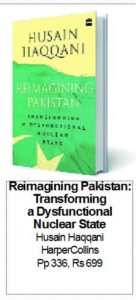A former Pakistani Supreme Court chief justice has been chosen as the caretaker prime minister until late July, when Pakistan is to hold general elections, the New York Times reports:
The appointment of the former justice, Nasir ul-Mulk, as the head of a neutral, interim government was announced at a joint new conference in Islamabad on Monday by Prime Minister Shahid Khaqan Abbasi and Syed Khurshid Shah, the opposition leader….The election marks the second democratic transition in Pakistan’s history, though it comes amid months of political tumult and civil-military tensions.
 “Mulk enjoys a good reputation in the wider political arena,” said Raza Rumi, the editor of Daily Times. “He’s seen as a neutral judge in the past without any political affiliation,” he said. “In a way it’s a good development,” added Rumi (right), a former Reagan-Fascell fellow at the National Endowment for Democracy.
“Mulk enjoys a good reputation in the wider political arena,” said Raza Rumi, the editor of Daily Times. “He’s seen as a neutral judge in the past without any political affiliation,” he said. “In a way it’s a good development,” added Rumi (right), a former Reagan-Fascell fellow at the National Endowment for Democracy.
“With the selection of the former chief justice as caretaker prime minister, Pakistan’s democracy is showing signs of a pulse, albeit a faint one,” said Arif Rafiq, a political analyst and a nonresident fellow at the Middle East Institute. “The major political parties are continuing a recent tradition of selecting by consensus an impartial figure to oversee the election process, thereby increasing the odds that it will be free, fair and credible.”
 But the real problem is the Pakistan Army’s self-image as the praetorian guard of an ideological state, one observer notes, with conflict against India as its raison d’etre, according to Christine Fair’s Fighting to the End, Aqil Shah’s Army and Democracy, and Husain Haqqani’s Reimagining Pakistan.
But the real problem is the Pakistan Army’s self-image as the praetorian guard of an ideological state, one observer notes, with conflict against India as its raison d’etre, according to Christine Fair’s Fighting to the End, Aqil Shah’s Army and Democracy, and Husain Haqqani’s Reimagining Pakistan.
Haqqani notes candidly : “Objective analysis cannot ignore the disconcerting highlights of Pakistan’s seventy-year history: four full fledged wars, one alleged genocide, loss of half the country’s land area in conflict, secession of the majority population, several proxy or civil wars, four military coups, multiple constitutions, long periods without constitutional rule, frequent religious and sectarian discord, repeated economic failures, numerous political assassinations, unremitting terrorism, continued external dependence and chronic social underdevelopment.”
 Pakistan’s Islamization “has proved to be a recipe for unceasing internal conflict,” Haqqani told Deutsche Welle. “The alternative is for Pakistan to evolve as a functional, territorial nation state and a working federation of its various component ethnicities and nationalities,” he adds:
Pakistan’s Islamization “has proved to be a recipe for unceasing internal conflict,” Haqqani told Deutsche Welle. “The alternative is for Pakistan to evolve as a functional, territorial nation state and a working federation of its various component ethnicities and nationalities,” he adds:
For that to happen, its leaders must take a stand against the unidimensional preoccupation with ideology….70 years of ideological orientation cannot be reversed overnight. Any attempt to phase out the invoking of religion as ideology would have to be gradual. Pakistan’s civilian and military leaders would have to work together to ensure over time that Pakistanis realize the pitfalls of their contrived national narrative.
Pakistan’s Federal Administered Tribal Areas have merged into Khyber Pakhtunkhwa Province, ending decades of rule established under 19th-century British colonial laws, RFE/RL reports. Before Pakistan’s President Mamnoon Hussain signed the measure on May 28, legislative approval of the long-debated constitutional amendment drew wild celebrations and sometimes violent protests.
An influential civil-rights campaign that grew among the country’s Pashtun population has sharply criticized the military’s dominance in the tribal regions, where Pashtuns are the majority, the New York Times adds:
Military actions have displaced a large part of the population, and officials have long been accused of involvement in extrajudicial killings and enforced disappearances. Mohsin Dawar, a leader of the movement, known by the initials P.T.M., welcomed the extension of judicial protections to the tribal regions but stopped short of supporting the merger. “Our entire struggle is based on the right to live,” Mr. Dawar said, adding that the movement would continue to protest against official abuses.
 The news was welcomed by civil society groups such as the Centre for Governance and Public Accountability (CGPA) which played a key role in pushing for the initiative, which one analyst called “bold.”
The news was welcomed by civil society groups such as the Centre for Governance and Public Accountability (CGPA) which played a key role in pushing for the initiative, which one analyst called “bold.”
“With its capricious system of justice and lack of full political representation, the tribal areas had become an embarrassment to the country’s elected leadership,” said Joshua White, a fellow at the Brookings Institution. “But in moving to reform the tribal areas, they should be commended for taking a bold and long overdue step to remedy a history of egregious disenfranchisement.”







